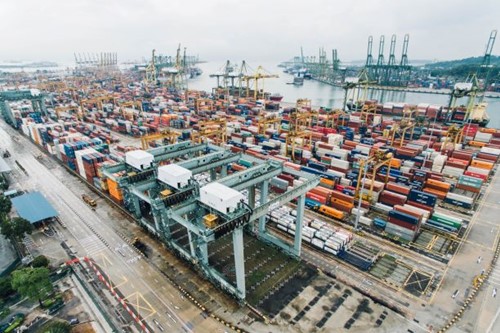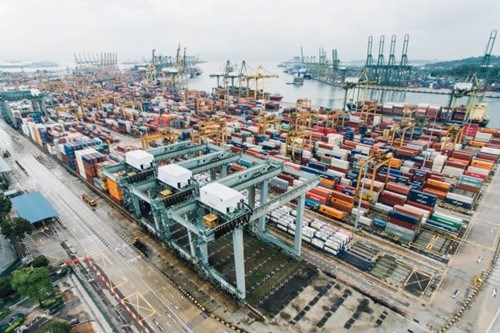
Blockchain Software Development for Supply Chains
In recent years, Blockchain technology has been adopted by various industries in order to improve and solving many specific industry-related problems. Blockchain provides companies a secure way to record all digital transactions and events/interactions on a distributed ledger. The power of blockchain technology is enormous and can provide many benefits to business organizations, their customers, and other parties involved.
Blockchain technology was originally developed for the purpose of recording and secure Bitcoin transactions, but it has quickly evolved beyond the use of crypto assets trading with many companies - especially in the finance industry - applying Blockchain to improve the effectiveness of their business processes and increase profitability.
In its simplest sense, Blockchain technology enables a secure way for the exchange of data between participants and provides a public ledger recording all digital transactions or interactions which is decentralized and can be accessed among a distributed network of computers.

Specifically, blockchain technology possesses many features and characteristics that could be useful for solving many existing problems in the logistics industry and supply chain management.
Current Issues in Supply Chain
Due to the rise of globalization with an exponential growth in international and cross-border trading, supply chain management has become more complex than ever resulting in a large network of logistics, involves many stakeholders such as transportation providers, freight forwarders, government custom, and warehouse management, etc.
One of the biggest concerns related to risks inherent in traditional Supply Chain Management is due to lack of visibility. Companies have to trust and depend on their stakeholders for operation, which occasionally leads to traceability breaches or frauds, particularly in the food and beverage manufacturing industry.
Moreover, it’s particularly difficult for companies to have full visibility of the supply chain to investigate when there is suspected frauds or breaches happened. Similarly, it’s also difficult for customers to have an overview of the lifecycle for the product they purchase due to a lack of transparency in the current supply chain management. Making supply chain information more reliable is one key business problem, which many companies find difficult to solve. Additionally, traditional technologies and tools do not provide adequate capacity to solve this problem.
How Does Blockchain Technology Assist Businesses in Streamlining Their Supply Chain Management?
Blockchain technologies enable Manufacturing companies to record all information and monitor every single interaction events occurring throughout the entire Supply Chain – including data recorded by IoT devices aggregated and analyzed into information. Ultimately providing the following benefits for Supply Chain Management, including:
- Availability: access to information recorded on the distributed ledger (Blockchain) ensuring transparency and visibility throughout the entire product cycle;
- Continuity of information: information related to transactions and/or digital interacting events recorded on blockchain is irreversible. The sharing of information between different stakeholders involved in the supply chain ensures traceability and reduce inherent risks.
- Fraud detection: effective fraud detection process can be enabled thanks to the transparent and auditable characteristics of blockchain technology.
Applications of Blockchain in Supply Chain
Food Traceability
Companies can use Blockchain technology (distributed ledger system) to keep track of the product status throughout its entire lifecycle. Here, the records are permanent and immutable. This makes it possible for buyers to trace a product to its origin.
Giant retailer Walmart has tested an application that tracks the sales of pork in China and produces in the US. Such an application lets companies know where the meat product comes from, as well as its processing and storage etc. In case of breaches in food safety or product recall, companies can see which batches are affected and the customers who purchase them.
IoT enabled Blockchain
An IoT enabled (RFID tags) blockchain has received increasing adoption in supply chain management for the purpose of storing and keeping track of information related to products. Many devices (e.g. smartphones) can read the RFID tags and process the information. A simple setup is as follows: manufacturers apply an RFID tag for a carton (bulk) or a single product as a unique identity and those RFID will be continued and updated on the blockchain throughout the supply chain. End users will be able to scan the RFID tags simply using their smartphone to trace the product to its manufacturer and origins.
Cold Chain Monitoring
Food and healthcare industries often required their products to be stored and transported under certain strict conditions. Applying sensors on those products can enable the recording of various logistics data such as temperature, humidity, and other related conditions. Such data can then be stored on the blockchain which is permanent and immutable. This is to guarantee that these special products are stored and distributed according to industry standards, ensuring quality. Any breach can be detected and responded to accordingly and in-time.
Challenges in adopting blockchain technology for Supply Chain Management
Blockchain technology, relatively speaking, is still a new one and there might be potential issues encountered during development. Companies looking to transform and enhance their business processes, specifically Supply Chain Management, with blockchain technology will need to consider a number of difficulties, including:
Ecosystem & Business Culture
Similar to other industries, supply chain management involves numerous important stakeholders and not all of them are ready to jump into the Blockchain train yet. A successful transformation requires buy-in from various parties willing to accept and adopt blockchain.
Moreover, in most supply chains, even though the involved parties are known and trusted and it’s very unlikely for them to reveal trade secrets such as prices, demands, capacities etc. to others. This means that access to information on blockchain needs to be private and restricted to known parties with limited access to certain segments of data.
The use of blockchain is on the rise, but it’s still far from mainstream adoption. Thus, it’s still a matter of time for all businesses to join the blockchain movement for a developed, mature ecosystem.
Technology and Knowhow
As mentioned previously, blockchain is still a fairly new technology, thus, it could be quite a challenge to hire qualified blockchain developers according to your business needs, especially considering specific industry requirements. Hiring or training existing in-house teams with blockchain programming takes time and resource consuming. A good choice for business is to outsource their blockchain development needs to a third party.
TP&P Technology's Expertise in Supply Chain and Blockchain Technologies
At TP&P Technology - Leading Vietnam Software Outsourcing Company, we understand the importance of applying Blockchain Technology in various industries to improve business process and value. We help create custom software solutions to meet various supply chain needs providing costs saving advantages for your business.
Contact us today to find out how we can help your business with our Blockchain Solutions Development Service!



